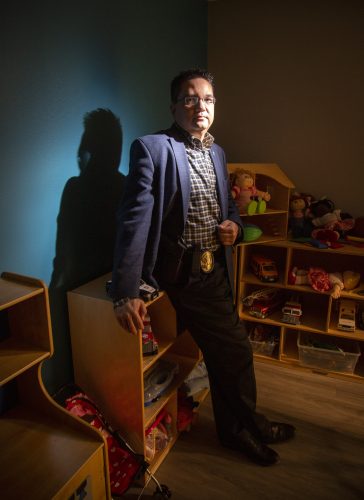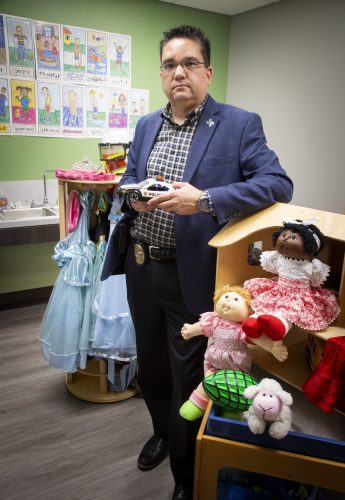Joe Adcock Fights for Children
The detective tracks down predators and stands by their young victims.
Joe Adcock Fights for Children
The detective tracks down predators and stands by their young victims.
Detective Joe Adcock ’95 has seen the importance of therapy for traumatized children firsthand.
He uses a dentist analogy to illustrate his point. “If your child has a cavity and he or she says, ‘Well, I’m not going to go to the dentist,’ you’re not going to say, ‘OK then, you’ll be OK,’ ” he said. “The trauma is kind of like a cavity, an emotional cavity that if it doesn’t get fixed, you’re going to have problems down the road.”

Joe Adcock, a Flower Mound, Texas, police detective, says, “I think the therapy component is critical for the ultimate welfare of the child.” Photo by Joyce Marshall
Adcock, who has worked in the crimes against children department of the Flower Mound, Texas, police since 2008, said he never expected to investigate criminal cases involving children. He worked as a patrol officer, patrol supervisor and background investigator/recruiter before moving to his current job. Adcock had been volunteering with the Children’s Advocacy Center for Denton County, so the crimes against children job was a good fit.
The majority of his cases now involve technology, including text messages and social media. Investigations can run from several weeks to many months. Adcock is involved in every step of the process, from raiding homes of predators to testifying alongside the children and family members.
The court process can be particularly daunting for children, especially those who have undergone trauma, Adcock said. If the case goes to trial, the child will likely have to testify. The Texas justice system offers therapy and counseling to help them cope with trauma and prepare for the courtroom.
“I think the therapy component is critical for the ultimate welfare of the child, even going into adulthood,” Adcock said.
With the guidance and support of counselors, children who work through the trauma of their abuse in therapy have fewer emotional, behavioral and mental developmental problems later in life, he said.
A case that stands out to Adcock is that of Kentucky high school teacher and coach Patrick Newman, who was convicted of exploiting 16 boys to produce child pornography.
Adcock, who also serves as a Department of Homeland Security task force officer, helped track down the teacher and worked with his Texas victim throughout the court process.
He said the parents of the Texas victim refused counseling for their son, choosing instead to “take care of it as a family.”
The boy went on to face issues in schools and with the police.

Detective Adcock has handled cases surrounding child abuse and trauma for over a decade. Photo by Joyce Marshall
“Whether or not he was going to have those issues anyway, I don’t know,” Adcock said. “But I think probably there’s going to be some correlation with him not going to counseling and learning boundaries and working through all those issues.”
After schools were shut down in March because of the coronavirus pandemic, reports to Child Protective Services in Austin decreased by 50 to 60 percent. The majority of child abuse cases are reported by teachers and counselors in schools, Adcock said, and the lack of in-person interaction made picking up the warning signs difficult.
Conversely, the rate of online child exploitation reports skyrocketed in the weeks following the shutdown. Adcock said calls to the National Center for Missing and Exploited Children increased 100 percent. The United States documented 1 million reports of illegal distribution of child pornography online in April 2019. In April 2020, there were 4.2 million reports.
During the summer, Adcock’s department prepared for an expected surge in abuse investigations that would follow students returning to schools in the fall.
Adcock said his team is dedicated to working harder than ever and to helping as many children as possible.

Your comments are welcome
Comments
Related reading:
Features
TBRI Helps Heal Trauma Victims
The Karyn Purvis Institute brings its methods for healing trauma to the criminal justice system.
Features
The Purvis Institute’s Global Mission
Trauma-healing techniques are reaching children around the world.
Alumni, Features
A Public Defender’s Fight for a Man’s Freedom
Attorney John Thomas’ innovative defense and commitment to his cause helped his client’s release.